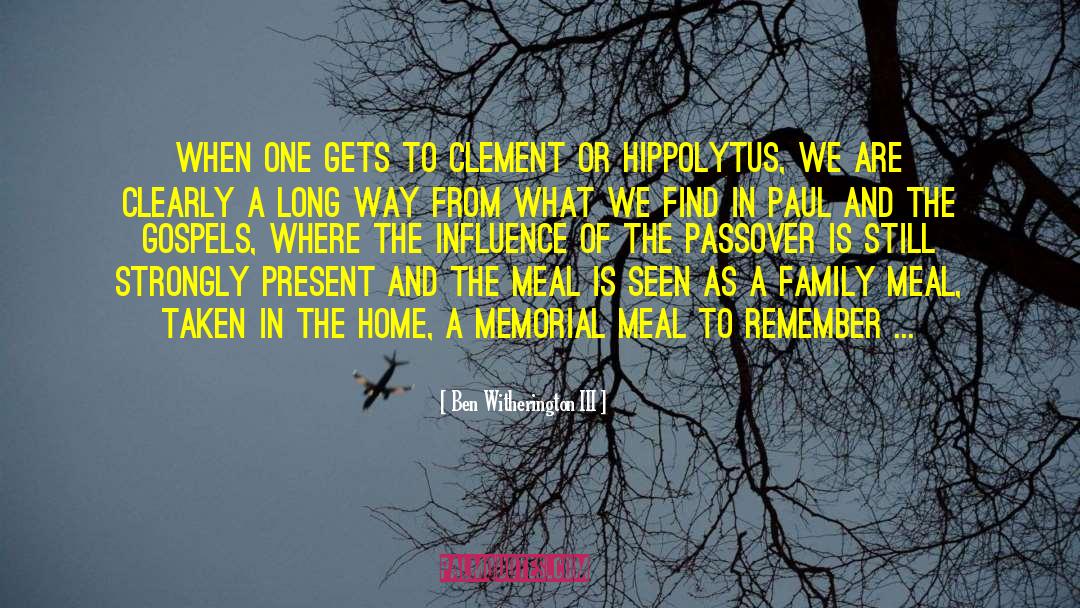Ben Witherington III Famous Quotes
Reading Ben Witherington III quotes, download and share images of famous quotes by Ben Witherington III. Righ click to see or save pictures of Ben Witherington III quotes that you can use as your wallpaper for free.
It would appear, then, that Jesus' praxis was to relate to all people, even the least, last, and lost, even notorious sinners, and allow them to be healed or helped by him without prior change of life or behavior.
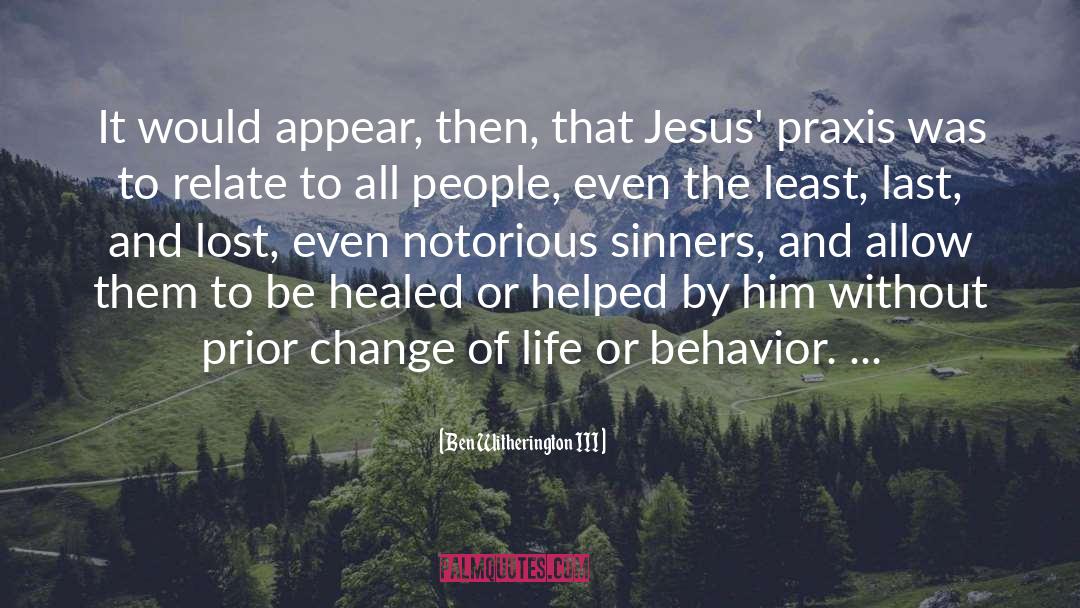
The exegetical foundations would appear to be weak, and one shouldn't build huge theological edifices, no matter how splendid or consistent, on weak foundations.

Sometimes silences are pregnant and sometimes not. It is hard to know what to make of the silence of much of the New Testament about the Lord's Supper. Perhaps it is simply an accident of time and circumstance. There was not a felt need to address the matter. What we should not likely conclude is that it was not seen as an important matter in the latter part of the first century A.D. What we can observe is that the Lord's Supper continued to be an in-home ceremony taken in the context of a fellowship meal. We also now know it was important in both Gentile and Jewish contexts in the church in the second half of the first century, and beyond. We see no evidence anywhere in this material that clerics of any kind are in charge of the meal and its distribution. Even in the Didache, prophets, who were mouthpieces for God, are only allowed to say the thanksgiving prayer as often as they like. The low ecclesiology, coupled with the ever-present eschatology, suggest that the Didache does indeed go back to the end of the first century A.D. But one precedent in the Didache does stand out: the Lord's Supper is for baptized Christians, and in particular for those who repent of their sins. We are on the way to the church of the Middle Ages in some respects, but we have not begun to localize or confine grace to the elements of the Lord's Supper itself and then have it controlled by clerics.

There is no hint here that preaching is thought of primarily as self-expression
of subjective experience or feeling-disclosure or autobiography or `telling one's story' so as to neglect Scripture."275 It is the Word that is to be preached.

At this juncture it is important to say something about Exodus 12:7. This verse implies that we are dealing with a ritual that did not involve atoning for sin, but rather was a rite of protection for God's people, a different though not unrelated matter. It involved a blood ritual to avoid God's last blow against the firstborn. Thus Passover and atonement were not originally associated, though apparently by Jesus' day there were some such associations. Notice that nothing at all is said or suggested here about Israel's sin, or about forgiveness. This ceremony is more like an insurance policy. Yes, the blood is to avert divine wrath, but it is not wrath against Israel's particular sins. In this case they simply happened to be too close to the danger zone, or in the line of fire. We must assume that this blood ritual arose before there even was a fully formed priesthood, for it is highly unusual to have such a ritual without any mention of involvement of priests.
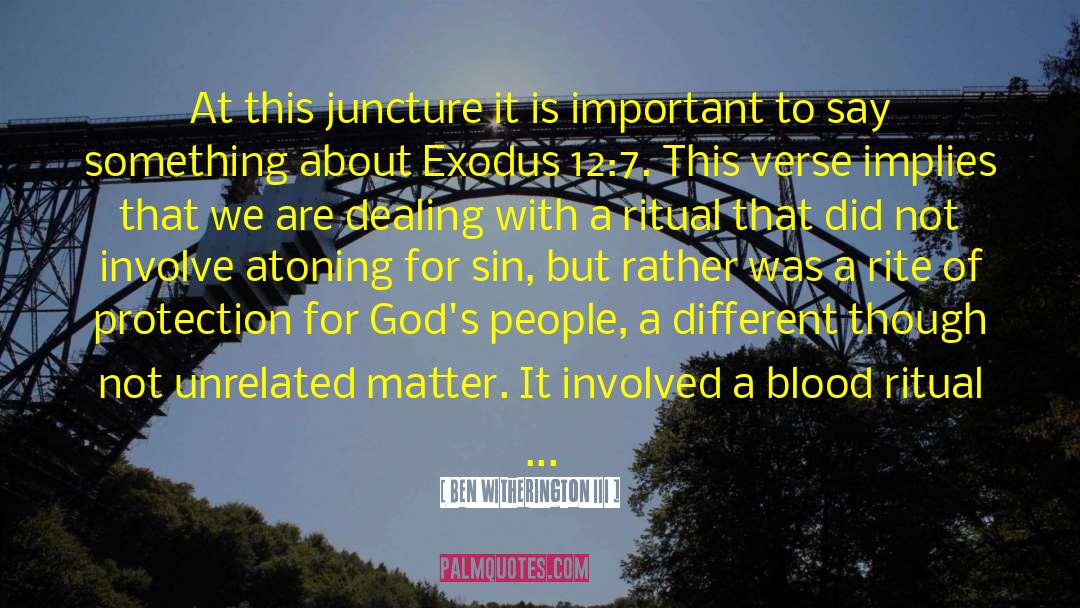
If a seminary or Christian college has a wise provost or dean or department chair, he or she will realize that they need some faculty who are master teachers but publish little, and some scholars who can both teach and publish, and some who would be better just being research professors. It takes a variety of faculty to make up a good school. But alas, even in schools that have such administrators, promotion and sabbaticals are often based on publications or planned publications, not just on reviews of one's classroom performances. Thus, some scholars who find research and writing a huge cross to bear are forced to carry that cross all the way to Golgotha Publishing House in order to get promoted. It really ought not to be that way at a Christian school, where the main goal should be training students or budding clergy in the way that they should go.

The ritual of the blood on the lintel of the door, which protected the Israelites from the angel of death, is an apotropaic (avoidance) ritual, such that the family in question would be 'passed over' by the aforementioned denizen of death. Later Jewish and Christian ideas that amalgamated this story with ideas about the scapegoat's providing a substitutionary remedy should not be read into the original tale. The scapegoat symbolized the removal of sin from the nation and perhaps the judging of a substitute. The blood of the Passover lamb on the door symbolized not a sacrifice for sin but rather protection from divine judgment. There is a difference.

Too often scholars have thought and even suggested that what happened during and after Constantine was that the church sought to replace the pagan temples, priests, and sacrifices with their own. This is at best a half truth. If this had been primarily what was going on, we would have expected to find priestesses showing up in the mainstream church in and after the time of Constantine, since there were certainly priestesses in the pagan temples. But this we do not find in the historical record. This is because the church of that period was not merely trying to supplant pagan religion with Christian religion, though some of that was going on. More to the point, there was a rising tide of anti-Judaism, and one of its manifestations was this Old Testament hermeneutic. The Torah had been claimed as the church's book, Jews were being ostracized and then later ghettoized, and a hermeneutic of ministry was being adopted which co-opted the Old Testament for church use when it came to priests, temples, and sacrifices, and indeed sacraments in general. Thus ironically enough while the structure of the ecclesial church was becoming more Old Testamental, the church hierarchy was not only becoming less tolerant of Jews, it was forgetting altogether the Jewish character of Jesus' ministry and his modifications of the Passover that led to the Lord's Supper celebration of the early church in the first place.

One of the things that happened when the church moved from meetings in homes to having purpose-built buildings beginning before, but accelerated during, the Constantinian era, is that while the church itself was becoming less Jewish in character, it began to apply a more and more Old Testament hermeneutic to its discussions about church, ministry, and sacraments. The church began to be seen as a temple or basilica, the Lord's Supper began to be seen as a sacrifice, and naturally enough the ones offering the sacrifices, just as in Leviticus, were seen to be priests. There was the further move in this direction when Sunday began to be seen as the Sabbath, another example of this same sort of hermeneutic. There were considerable problems with this whole hermeneutic from the start, since nowhere in the New Testament is there set up a class of priests or clerics to administer any sacraments. Indeed, nowhere was there a clear separation between life in the home and life in church. What has often been missed in the discussions of the effects of all this is that it ruled women out of ministry in the larger church and indeed ruled them out of celebrating the Lord's Supper as well, since in the Old Testament only males were priests and only priests could offer sacrifices.
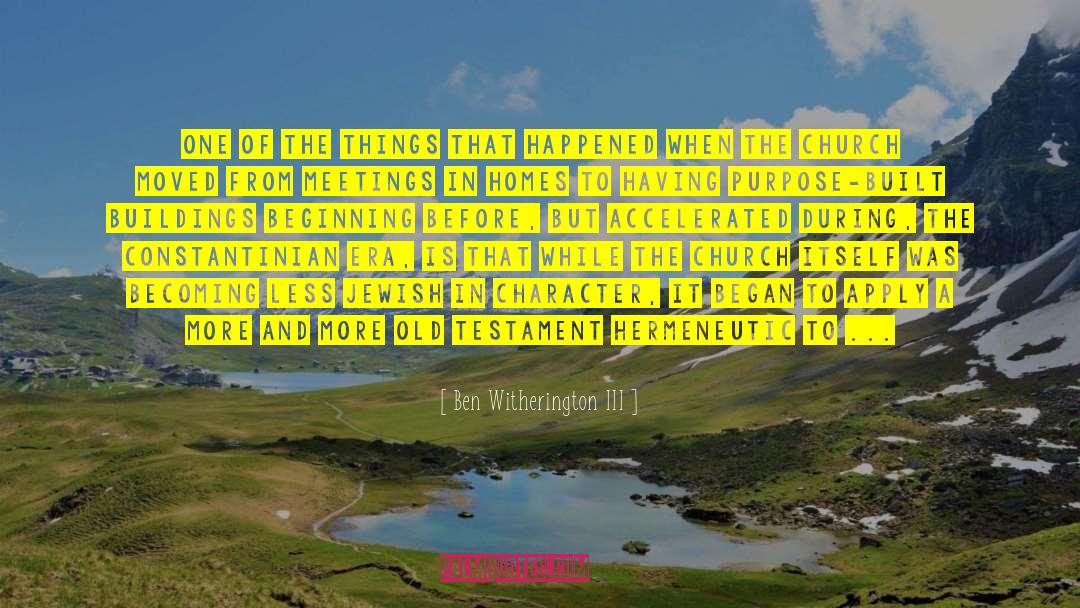
The reference in 1 Corinthians 11:27 is to Christ's actual body, which was crucified, as the reference to blood makes evident. Anaziõs has been translated 'in an unworthy manner,' and sometimes incorrectly thought to modify not the way of partaking but the character of the persons partaking. But Paul refers to those who are partaking in an unworthy manner, not those who in themselves are unworthy, which presumably Paul would see as including any and all believers. No one is worthy of partaking of the Lord's Supper; it's not a matter of personal worth. Paul is rather concerned with the abuse in the actions of the participants, or at least some of them. Paul says that those who partake in an unworthy manner, abusing the privilege, are liable or guilty in some sense of the body and blood of Jesus. They are, in addition, partaking without discerning or distinguishing 'the body.
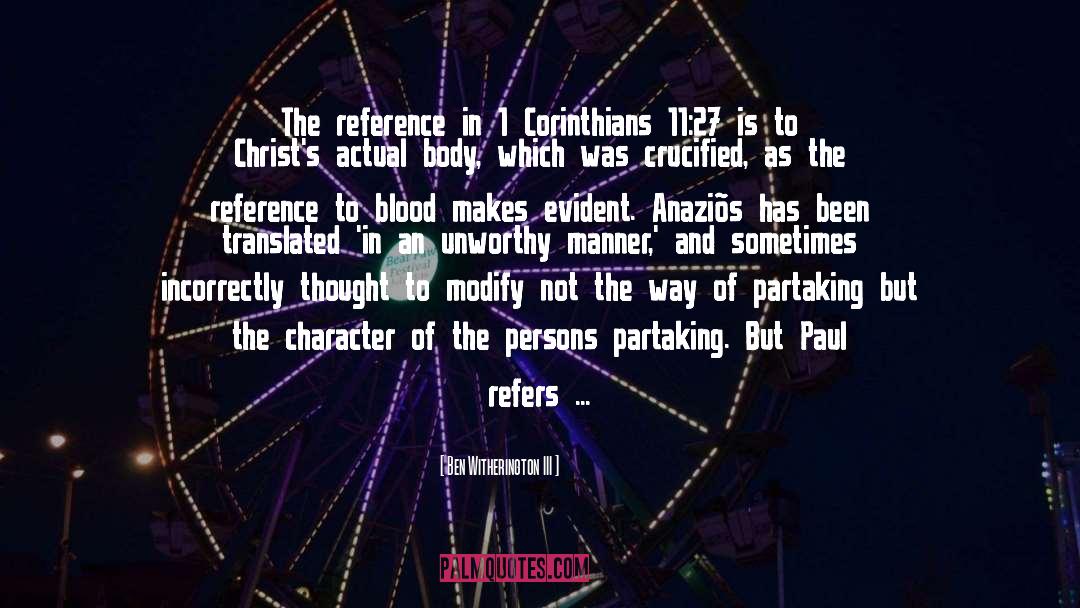
Verse 12 [of Ex. 12) tells us that the judgment of Yahweh is not only on the Egyptians but also on their deities. This is probably an allusion to the fact that Egyptians would often pray for the safety of their firstborn, particularly firstborn sons, as was the custom in many ancient patriarchal cultures. The death of the firstborn would be seen as a sign of the anger or perhaps the impotence of their gods. This is worth pondering when it comes to the death of Jesus as God's only begotten, or beloved, Son. Would Jesus' contemporaries have assumed his death was a manifestation of God's wrath? Probably so. In any event, Yahweh is showing his superiority over the spirits behind the pagan deities, and thus we should not overlook the supernatural struggle that is implied to be behind the contest of wills between Moses and Pharaoh.
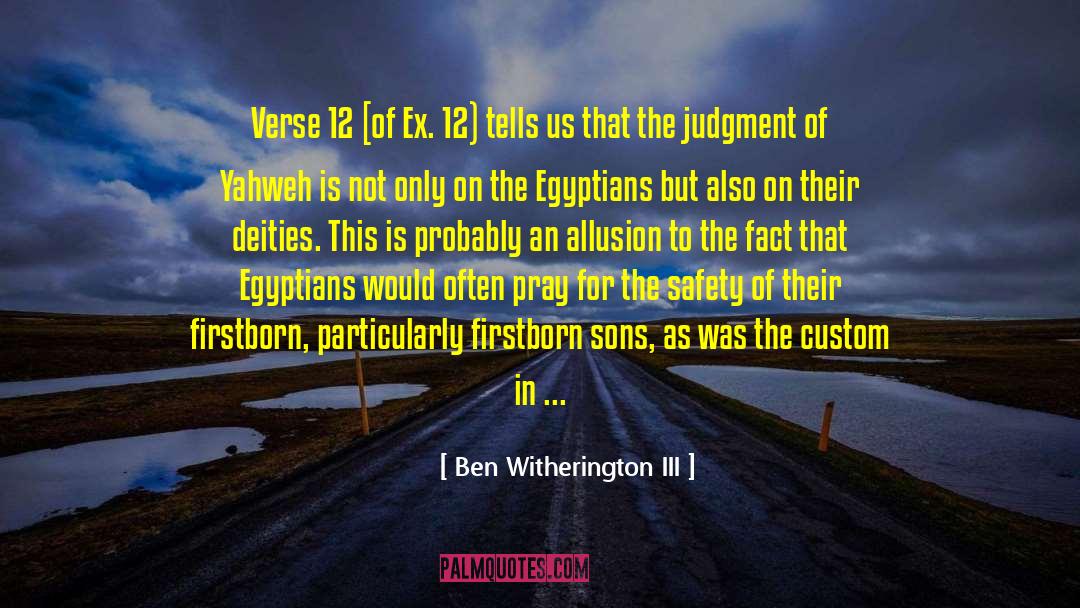
When one gets to Clement or Hippolytus, we are clearly a long way from what we find in Paul and the Gospels, where the influence of the Passover is still strongly present and the meal is seen as a family meal, taken in the home, a memorial meal to remember Jesus' death until his return ... Here then is a cautionary reminder - the less Jewish the approach one takes to the Lord's Supper, the more likely one is to be wrong about one's assessment of what is the case about the elements.
